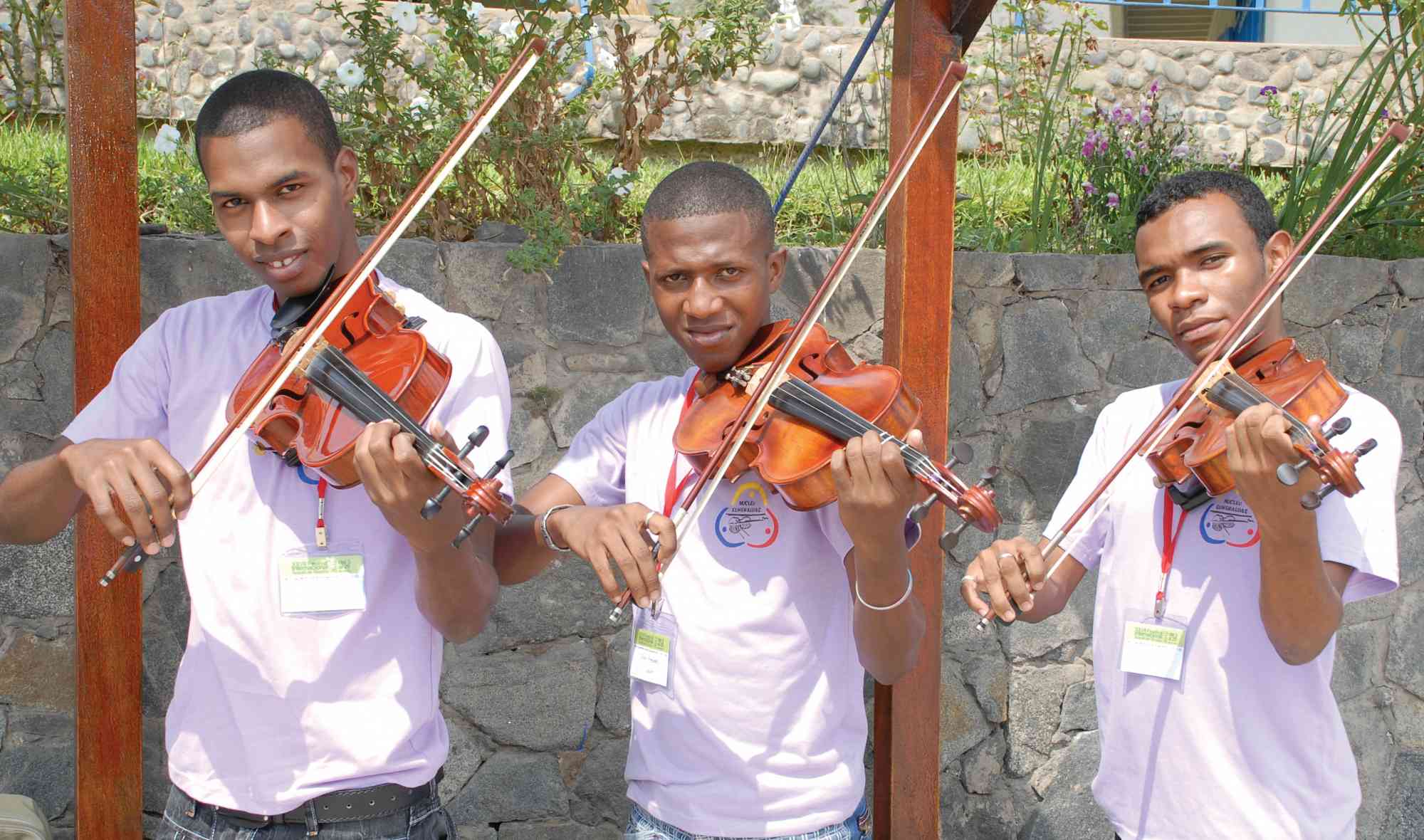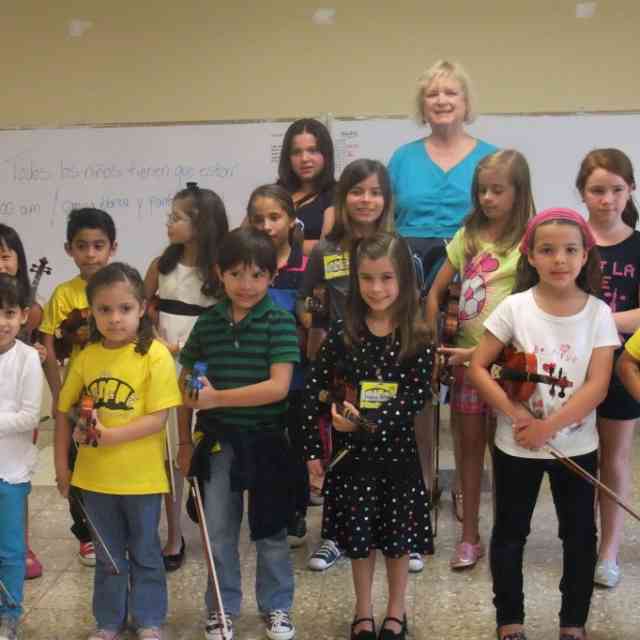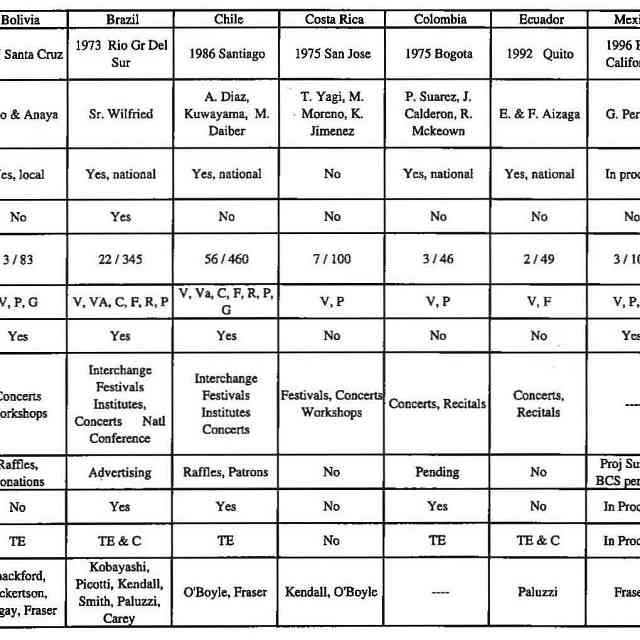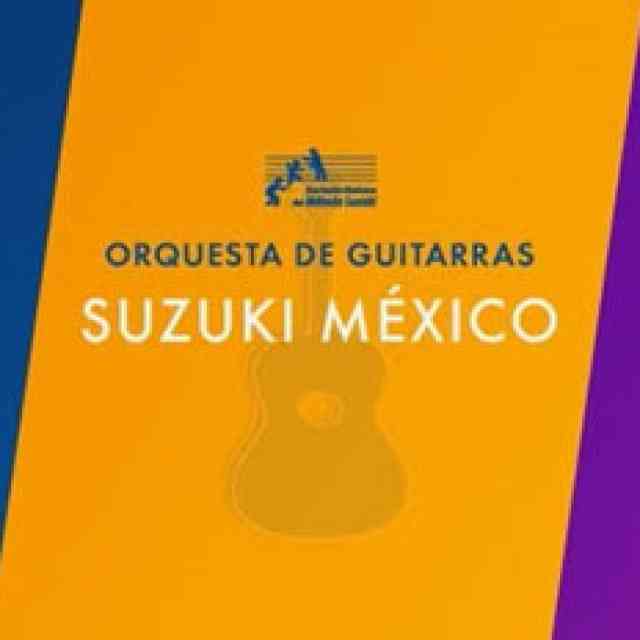David Evenchick, cello teacher trainer from Canada, writes:
Thanks to the Suzuki Association of Peru and the SAA I have had the honor and privilege of teaching in Latin America. As members of the Suzuki community we understand that bringing together young (and not-so-young) musicians from diverse backgrounds can break down cultural and political barriers. At the 27th annual Suzuki International Festival in Peru last January I saw how this cooperation works like a productive musical ensemble.
One of the outstanding features of this Festival is the repeated acknowledgement that all of the participating countries receive at each and every event; just like in an ensemble, it is important to empower each individual member.
The individuality of each member of an ensemble is respected, keeping members invested in the group and giving their best effort. At the Festival, each country is encouraged to celebrate and share their traditions with others, including dance, singing and folk instruments, culminating in a concert of Latin American music. Participants take a tremendous amount of pride and joy in presenting this concert.
In an ensemble there is an understanding that the energy and cooperation of the group is directed toward the process of revealing the music itself, regardless of its provenance. One of the highlights of the Festival this year was the massive Sinfonia Latina, comprised of young musicians from eleven Latin American countries. Rather than the traditional European masterpieces, the program consisted of eleven indigenous works—one from each represented country. Watching and listening to these students perform and cheering on the music of their neighboring countries made this a thrilling and heartwarming event!
To be a part of this is a huge inspiration and truly an enriching experience. It is a model of international cooperation.
The 27th International Suzuki Festival and 2nd Latin American Suzuki Students’ “Encuentro” were held in Lima, Peru in January 2012. Around 1500 people attended these events. Participants traveled from Argentina, Bolivia, Brazil, Canada, Chile, Colombia, Ecuador, El Salvador, England, Guatemala, Mexico, Paraguay, Puerto Rico, Scotland, Venezuela, the United States and from all over Peru, including the jungle region, the coast and the Andean mountains.
Many thanks to our wonderfully generous and flexible team of SAA teacher trainers: Helen Brunner, David Evenchick, Nancy Lokken, Mary McCarthy, Fernando Piñero, Mary Craig Powell, MaryLou Roberts, Shinobu Saito, and Kelly Williamson. In addition to Suzuki courses, the Suzuki Association of Peru reaches out to the community by offering extremely successful workshops for the general public; Roberta Centurion gave workshops on Dynamics of Teaching Music in the Elementary Classroom, and Talent Education for teachers, community workers and parents. Roxana Del Barco and Maria Luisa Labarthe offered workshops in Early Childhood Music. In addition workshops for teachers in Kodaly were offered by Lydia Mills from California, including a seminar on children’s songs and rhymes in English. All courses are accompanied by a teaching practice component which the participants and teacher trainers find most instructive! Participants learn to teach by teaching, and teacher trainers evaluate their own teaching by seeing how well the concepts taught during the courses have been understood.
Special congratulations go to the coordinators of the Festival, Roberta Centurion and Annika Petrozzi, to the producer, Deisy Cotera and to all the teachers, participants and office staff who made the festival possible.
Kelly Williamson, flute teacher trainer from Canada, writes:
As always, the flute classes were a pleasure to be a part of, with teachers from various backgrounds and with different perspectives to offer. At the top of the list was the very first SAA Practicum Unit in Flute in Latin America, attended by a select group of experienced teachers from all over Latin America. From Patagonia, Argentina, came Fernando Formigo, whose student Martin Cappi was selected to play for Jeanne Baxtresser in master class at the upcoming SAA Conference in Minneapolis. (Two of Fernando’s other students will also participate in the honors flute choir. Hats off to the Orquesta de Flauta Traversa de San Martin de los Andes!) Diana Bettin from Bogota, Colombia, Eugenia Aizaga from Quito, Ecuador, and Winivere Roman Meneses from Arequipa, Peru, rounded out the class of four participants. We were fortunate to have the frequent participation as well of Mary McCarthy, teacher trainer in piano, so altogether we enjoyed a very broad view point indeed as we shared ideas about effective communication in lessons and transmitting Dr Suzuki’s philosophy to parents.
Books One and Two were also offered for flute, with four participants in the Book Two class and seven in Book One. Attendees in these classes came additionally from Brazil (Fernanda Castro), Mexico (Kaneko Serrano), Chile (Danilo Toledo Gavilan), and for the first time in flute classes at the Lima festival, we had participants from Bolivia (Marcela Barbery) and the Peruvian Amazon (Scarlett Lozano Urrea). In total we had fifteen flute teacher participants from nine different Latin American countries—very exciting! Outside of class, highlights included performing Ian Clarke’s Walk Like This! with the Practicum and Book Two participants, and going out to Barranco for drinks with the Book One class (thank you to Juan Carlos Rodriguez Pomar of Lima for organizing us!) Two people were in the Book One class as repeat attendees—Matilde Mejia from Argentina took Book One for the first time this past fall, and already chose to repeat it as well as take Book Two in Lima. On the other end of the spectrum, Eugenia Aizaga has studied all fourteen books in the Suzuki flute repertoire, has previously repeated the early book classes, and was repeating the course once again. We all valued the contributions of all participants—from those who were not yet teaching flute, to those who have been teaching for a long time, very highly.
Follow-up from the class has continued with access to supplementary materials via my Drop Box account. I decided to try this as an experiment, and have offered it to all of the participants in Lima this year, as well as to the people who took Book One with me last year in Argentina and in Canada at the Great Lakes Institute. Additionally, we connect through Facebook and our special Spanish-language Facebook page “Flauta Suzuki!”, which anyone is welcome to join. I enjoy hearing updates from the Suzuki flute teachers all over the world —most recently I heard from a couple of the teachers in Paraguay via the web. Let’s keep energized together! Heads up for the next Lima
festival: a special class will be offered for one hour daily to play through repertoire in the books that are not being offered that year, especially the upper books. I have recognized that there is a lot of interest in reviewing the advanced repertoire, and we don’t usually have the time to fit it in. So flutists —start reviewing those upper
books, and come to Lima in 2013 to reunite with your friends and colleagues over some great music and good times—as always!
Mary Halverson Waldo, recorder teacher trainer from the US, writes:
The flauta dulce (recorder) showed a lively presence at the 2012 Lima Festival. Especially exciting this year were the number of highly skilled young teacher participants. These dynamic ambassadors for the recorder displayed excellent teaching skills, and they inspired audiences with their stunning solo and chamber music performances, on contemporary as well as historical repertoire.
A wonderful feature of this Festival is always the large number of students, who come from a wide variety of socio-economic backgrounds, including the most financially-challenged communities; I like to refer to the recorder as the “every child can afford” instrument! The quality of the student performances improved remarkably since my last visit, and master classes involved repertoire through Book Five.
Shinobu Saito, violin teacher trainer from Brazil, writes:
I took the philosophy course in January 2012 with Caroline Fraser in Lima, Peru. It was a very large class, with an attendance of more than one hundred participants from all over Latin America. The course lasted five days. During the morning we had class with Caroline, who taught us day by day how to teach to play an instrument in the same way a child learns to speak his mother tongue. With much praise, repetition, imitation, and persistence, we all began to understand why young children are able to become so proficient in the performance of their instrument. She also helped us guide Suzuki parents in helping their children with daily practice.
In the afternoon we attended individual lessons to observe children being taught by various teacher trainers. Trainees were to observe at least eight hours of instructions, but in the end many of us saw much more than was required. I attended lessons of several different instruments for more than fifteen hours of observation; the lessons were very interesting and instructive. Many transformations took place for the trainees in these five days.
After returning to Brazil in early February, I taught the philosophy course for ten trainees, the same course I had just taken in Lima. It was my first time teaching the philosophy course, since until then I had only taught the ¬”Every Child Can!” class, which is six hours long. While teaching this philosophy course I saw a great difference in the trainees’ understanding of Suzuki philosophy. They learned how to instruct parents and students in a more positive way, and learned to praise their work, not only their results. In many cases, some of the trainees had never received compliments for their work, because consistent results take time to show in their student’s performance. I was very satisfied with the course I taught and the results I achieved with the trainees. I believe they understood with more clarity what Dr. Suzuki intended to teach us all.
I would like to express a special thank you to Caroline Fraser for lending me all the DVD materials that she has collected over the years which were so essential to teach this philosophy course. These materials were greatly appreciated by the trainees.
Andre Peixoto, violin teacher from Brazil, traveled several days early in order to help in the office. Thank you Andre! Andre writes:
This year’s Festival and Encuentro were very special to me. I was there simply to help in whatever way I could! Having the opportunity to arrive some days before the festival started and help make an event of this importance happen was a wonderful experience that magnified and renewed my Suzuki spirit.
Young five-year-old Maria traveled with her parents from Mexico for the event. Her mother Claudia writes:
We traveled to Peru with our five-year-old daughter, and having her participate in this experience with hundreds of people from so many countries in such harmonious musical context was one of the most amazing highlights of her life. For her, and for us as Suzuki parents, these festivals add so much value to our daily musical study. It was an amazing experience and a great opportunity to be there and we hope to be able to come back to every festival. We are greatly thankful to all the people in Peru who organized the XXVII International Suzuki Festival.
Following the I Suzuki Festival in Guatemala, sponsored by Visión Mundial Guatemala and held in October 2011, Adolfo from was able to travel to Peru for the first time, thanks to an SAA scholarship. He writes:
The Peru Suzuki is an opportunity of singular importance for the development of music as a means of communication and interaction with people from different corners of Latin America. That, along with the growth of a pedagogical context in our societies, frames an event that changes lives.
Alexis from El Salvador was able to travel to Peru for the first time, as his student’s parents paid for his ticket and his accommodation! He writes:
I have been teaching Suzuki guitar since 2007. This year I participated in the XXVII Suzuki International Festival of Peru. My travel was the successful result of a strong Suzuki triangle! I have a Suzuki student whose family has had a positive music learning experience and as a sign of their gratitude they helped pay for my plane ticket so that I could fly to Peru and take part in the Festival.
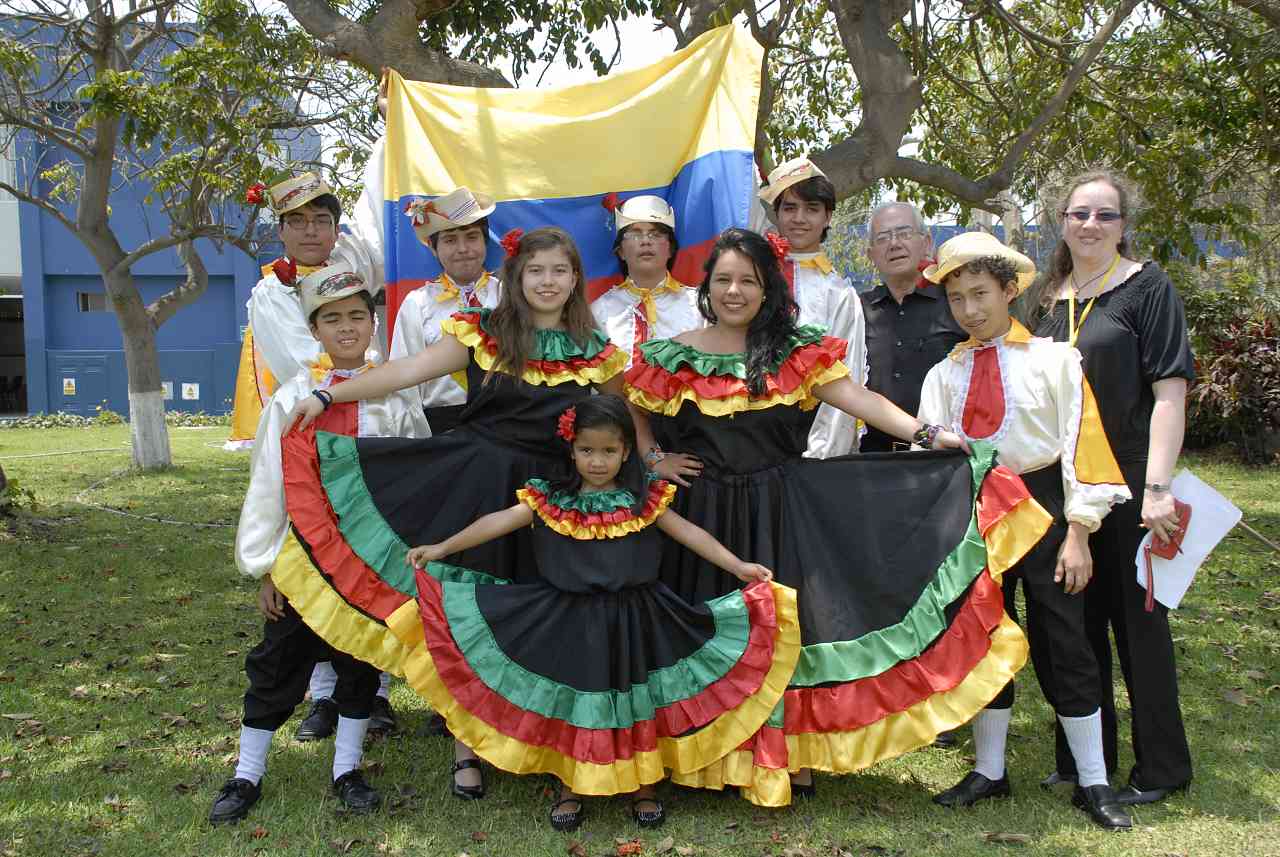
Encuentro delegation from Bogota, Colombia, with country coordinators Dilva Sanchez and Marcelino Prats
Marcelino Pratts, violin teacher from Colombia who generously gives of his time and expertise during the festival, writes:
The big challenge of education is to reach a larger number of people and deliver a high quality of education. The festival allowed us to broaden our awareness of a Suzuki method that lives on, transforms itself, and gets renewed permanently.
Some highlights of this years’ festival include:
-
A delegation of more than fifty traveled from Esmeraldas, Ecuador, with many making the journey by bus. The group, directed by Rommy Miller, gave an excellent, colorful presentation during the Inaugural Concert, playing music from their region and performing traditional dances in regional costumes. This was an impressive demonstration of what can be possible from a Suzuki program less than two years old. The Ecuadorian Ambassador in Peru was so impressed that he invited the delegation back to his residence for dinner!
-
The Inauguration of the second part of the festival was dedicated to a celebration of the life of Doris Koppelman, who had accompanied us in so many previous festivals, including January 2011. Two young piano teachers, Natalia Grima from Argentina and Alexander Ramirez from Colombia, had collaborated over a video of Doris teaching students, teaching teachers and performing. A young Peruvian violin teacher, Lindsey Pre Kong, worked on the editing. Doris would have been so happy to see the next generation working together internationally! In addition to showing the video, Natalia had come with a surprise. She brought a portrait of Doris painted by her father in Argentina. He had never met Doris, but based his portrait on a photo taken from the internet. What a labor of love! We unveiled the portrait and I said a few words, including Doris’ own words from the interview I made with her in May. Piano students performed, including the same Claudio Armas Doris mentions in her interview. The video, which ended with an image of Doris at the piano with the words “Gracias Doris,” was received with a standing ovation.
-
Included in the Festival was a meeting of the Suzuki Association of Peru in which the different regions gave presentations on their programs and the decision was taken as to where the National Workshop would be held. This year the Peruvian National Workshop will be held in Trujillo, a city on the North Coast of Peru.
-
The teacher trainers went on a trip to the Amazon jungle on their days off!
-
Sergio Nievas from Argentina offered a double bass workshop and was impressed by the level of the Peruvian students’ playing.
II Encuentro de Alumnos Suzuki de América Latina Enero 12 al 16, 2012
This five-day event was the result of true international collaboration. Peruvian recorder teacher Luciana Castillo headed the Organizational Committee along with Fabio Dos Santos, violin teacher from Brazil, and Etna Diemecke, piano teacher from México, as coordinators. Dario Dominguez from Argentina acted as Artistic Director and conductor of the orchestra. In addition, each of the participating countries had its coordinator. Representing Colombia were Dilva Sánchez and Marcelino Prats; Argentina, Graciela Vides; Costa Rica, Lidia Blanco and Rosa Iris Acuña; El Salvador, Alexis Rivera; Ecuador, Eugenia Aizaga; Chile, Sara Benitez and Blancamaría Montesinos; Bolivia, Magali Pinto; México, Etna Diemecke; Paraguay, Álvaro Morel; Brasil, Fabio dos Santos; and Peru, Ana Lucía Nieto.
Preparation for the Encuentro took place in January 2010 when the Organizing Committee was established and the guidelines were agreed upon for the student participation. Then during the V Latin American Teachers’ Conference in 2011, the orchestral arrangements the countries had sent were tried out and corrections were made. Finally, more than 170 participants from eleven countries came together in Peru in 2012, rehearsing intensely and performing in three concerts. One concert took place on the outskirts of Lima in a district called Carabayllo, where classical music is seldom heard. After this concert, a little boy from the audience ran up to me and said “Thank you for the party!” The Gala Concert was received with great enthusiasm. The front of the stage was adorned with the flags of the participating countries and some of the performers in their colorful national costumes spontaneously started to dance in the encore of the music of their country. It was a joyous and spectacular event!
Fourteen-year-old Erika from Argentina writes:
It was such a pleasure to be again in Lima, from Argentina, being part of an orchestra, seeing old friends and making new ones! I also loved celebrating my ten years with the Suzuki method with the II Youth Latin American Orchestra and the XXVII International Suzuki Festival of Peru. I experienced many emotions: happiness for being with my cherished people doing what I love to do; pride for being part of something as important as the Orchestra; and appreciation for the wisdom obtained from all the people I worked with. In summary, I felt great! Because of all that I would like to thank each of the people who made possible, with their work and efforts, to unite all Latin Americans with the primary goal of making music… We are making Dr. Suzuki’s dream and ours come true: to build a better world through music.
Mercedes, Erika’s mother, writes:
I’d like to express a heartfelt thank you to everyone who organized and made possible our wonderful II Encuentro and our XXVII International Suzuki Festival. As families, and with the Latin American friendship that unites us all, we enjoyed some beautiful music-making days. We, the parents, had the pleasure to accompany our singing children, as they participated in the “Latin Symphony” choir. Thanks to the priceless contributions of our conductor, Dario Dominguez.
Mexican piano teachers Leslie Mizrahi and Etna Diemecke write:
It was wonderful to see so many Suzuki students from eleven different Latin American countries playing together with joy and enthusiasm, throughout several days of intense work. The quality of interpretation, the great commitment, and artistic level of the students made these performances very special, where friendship, fraternity, and a sense of community were present.
Many thanks to all who have made the Festival and Encuentro possible: the Suzuki Association of the Americas, the United States Embassy in Peru, Colegio Reina de Los Angeles, contributors to the Peru Festival Fund, and Latin American families and students.
Seeing the children from countries that at times have been at war, play together with love, joy and passion, I thought of Pablo Casals words: “Maybe it is music that will save the world.”
News from Ecuador
In March 2012, as a direct result of the Suzuki Festivals in Peru, Ecuador held its 1 International Suzuki Festival Ecuador 2012 with 119 participants in the philosophy course. The excellent organizing committee was made up of participants who had already experienced the festival in Peru. The Instituto de Investigación, Educación y Promoción Popular del Ecuador (INEPE) sponsored the event along with the Catholic University of Ecuador. Ecuadorian violinist Felipe Aizaga gave a moving performance of Piazzolla’s Oblivion. He had started his violin lessons at age five with his father, whose name was also Felipe Aizaga, one of the first Suzuki teachers in Ecuador. You can see Felipe’s performance on You Tube.
Congratulations to the Festival organizers Pablo Ochoa, Juan Carlos Roales and their great team! They are already planning more courses for November. We will be hearing much more from Ecuador in the future.
Our plans in Latin America include ongoing festivals and courses in Argentina, Brazil, Chile, Costa Rica, Ecuador, El Salvador, Colombia, Guatemala, Mexico, and Puerto Rico. We are already planning a Mini Encuentro for teachers for 2013, the VI Latin American Teachers’ Conference for 2014 and the III Encuentro para Alumnos Suzuki de America Latina for 2015. We’ll see you there! ¡Muchas gracias!
Translated by Cecilia Calvelo Hopkins, Caroline Fraser and Lindsay Pre Kong. Very special thanks to Cecilia!
